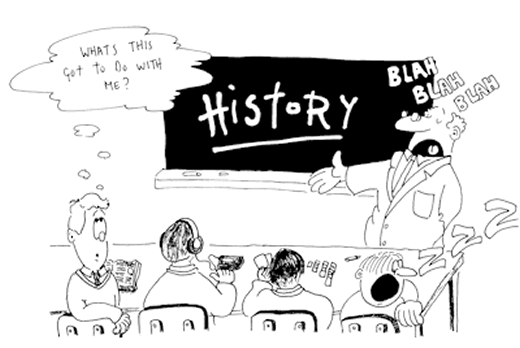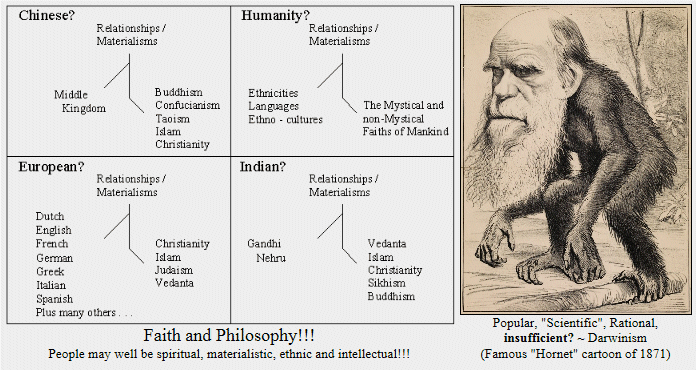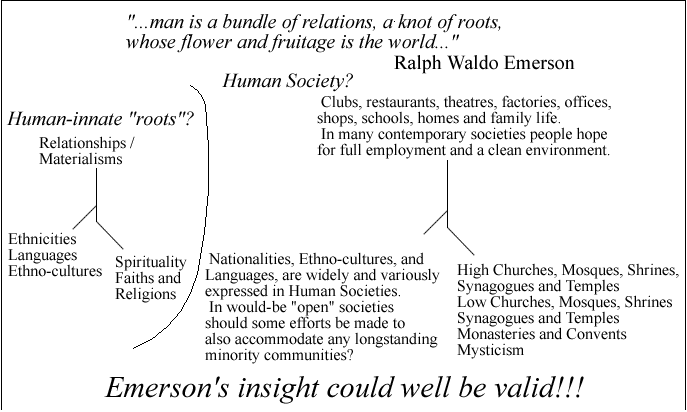Why do we study History / Why is History Important?

The following quotations and quotes might help to persuade that both studying and knowing about History - are truly important!

"We study history not to be clever in another time, but to be wise always."
Marcus Tullius Cicero

"History is not a burden on the memory but an illumination of the soul."
Lord Acton

"The biggest challenge facing the great teachers and communicators of history is not to teach history itself, nor even the lessons of history, but why history matters. How to ignite the first spark of the will o'the wisp, the Jack o'lantern, the ignis fatuus [foolish fire] beloved of poets, which lights up one source of history and then another, zigzagging across the marsh, connecting and linking and writing bright words across the dark face of the present. There's no phrase I can come up that will encapsulate in a winning sound-bite why history matters. We know that history matters, we know that it is thrilling, absorbing, fascinating, delightful and infuriating, that it is life."
Stephen Fry, Making History

By way of contrast, the following quotation is a particularly blatant example of those deeply cynical quotations and quotes about the importance of History which we would most definitely not accept - as being an accurate assessment of the broad sweep of History in all its complexity.
"History is an account, mostly false, of events, mostly unimportant, which are brought about by rulers, mostly knaves, and soldiers, mostly fools."
Ambrose Bierce

We now return to quotations and quotes which accept the importance of History and suggest that a knowledge of History is important.
"Why on earth does it matter what happened long ago? The answer is that History is inescapable. It studies the past and the legacies of the past in the present. Far from
being a 'dead' subject, it connects things through time and encourages its students to take a long view of such connections.
All people and peoples are living histories. To take a few obvious examples: communities speak languages that are inherited from the past. They live in societies with complex cultures, traditions and religions that have not been created on the spur of the moment. People use technologies that they have not themselves invented. … So understanding the linkages between past and present is absolutely basic for a good understanding of the condition of being human. That, in a nutshell, is why History matters. It is not just 'useful', it is essential."
Penelope J. Corfield, Professor Emeritus, University of London.
All people and peoples are living histories. To take a few obvious examples: communities speak languages that are inherited from the past. They live in societies with complex cultures, traditions and religions that have not been created on the spur of the moment. People use technologies that they have not themselves invented. … So understanding the linkages between past and present is absolutely basic for a good understanding of the condition of being human. That, in a nutshell, is why History matters. It is not just 'useful', it is essential."
Penelope J. Corfield, Professor Emeritus, University of London.
"The value of history is, indeed, not scientific but moral: by liberalizing the mind, by deepening the sympathies, by fortifying the will, it enables us to control, not society, but ourselves -- a much more important thing; it prepares us to live more humanely in the present and to meet rather than to foretell the future."
Carl Becker, 1873-1945, U.S. historian

"The disadvantage of men not knowing the past is that they do not know the present."
G. K. Chesterton

"The past is never dead; it's not even past."
Gavin Stevens (William Faulkner)

"Men make their own history, but they do it under circumstances directly found, given and transmitted from the past."
Karl Marx

"In history, a great volume is unrolled for our instruction, drawing the materials of future wisdom from the past errors and infirmities of mankind."
Edmund Burke

"History is for human self-knowledge ... the only clue to what man can do is what man has done. The value of history, then, is that it teaches us what man has done and thus what man is."
R. G. Collingwood

"What man is, only history tells."
George Mosse
Such celebrated "Men of Letters" as Emerson and Shakespeare have accepted that Human Nature is 'Tripartite' and Emerson accepted that there was an investigable association between Human Nature and History.
Ralph Waldo Emerson
RALPH WALDO EMERSON (1803-1882) was, in his time, the leading voice of intellectual culture in the United States. He remains widely influential to this day through his essays, lectures, poems, and philosophical writings.
In the later eighteen-twenties Ralph Waldo Emerson read, and was very significantly influenced by, a work by a French philosopher named Victor Cousin.
A key section of Cousin's work reads as follows:
"What is the business of history? What is the stuff of which it is made? Who is the personage of history? Man : evidently man and human nature.
There are many different elements in history. What are they? Evidently again, the elements of human nature. History is therefore the development of humanity,
and of humanity only; for nothing else but humanity develops itself, for nothing else than humanity is free. …
… Moreover, when we have all the elements, I mean all the essential elements, their mutual relations do, as it were, discover themselves. We draw from the nature of these different elements, if not all their possible relations, at least their general and fundamental relations."
Introduction to the History of Philosophy (1829)
… Moreover, when we have all the elements, I mean all the essential elements, their mutual relations do, as it were, discover themselves. We draw from the nature of these different elements, if not all their possible relations, at least their general and fundamental relations."
Introduction to the History of Philosophy (1829)
Even before he had first read Cousin, (in 1829), Emerson had expressed views in his private Journals which suggest that he accepted that Human Nature, and Human Beings, tend to display three identifiable aspects and orientations:
Imagine hope to be removed from the human breast & see how Society will sink, how the strong bands of order & improvement will be relaxed & what a deathlike stillness would take the place of the restless energies that now move the world. The scholar will extinguish his midnight lamp, the merchant will furl his white sails & bid them seek the deep no more. The anxious patriot who stood out for his country to the last & devised in the last beleagured citadel, profound schemes for its deliverance and aggrandizement, will sheathe his sword and blot his fame. Remove hope, & the world becomes a blank and rottenness.
(Journal entry made between October and December, 1823)
In all districts of all lands, in all the classes of communities thousands of minds are intently occupied, the merchant in his compting house, the mechanist over his plans, the statesman at his map, his treaty, & his tariff, the scholar in the skilful history & eloquence of antiquity, each stung to the quick with the desire of exalting himself to a hasty & yet unfound height above the level of his peers. Each is absorbed in the prospect of good accruing to himself but each is no less contributing to the utmost of his ability to fix & adorn human civilization. (Journal entry of December, 1824)
Our neighbours are occupied with employments of infinite diversity. Some are intent on commercial speculations; some engage warmly in political contention; some are found all day long at their books … (This dates from January - February, 1828)
In all districts of all lands, in all the classes of communities thousands of minds are intently occupied, the merchant in his compting house, the mechanist over his plans, the statesman at his map, his treaty, & his tariff, the scholar in the skilful history & eloquence of antiquity, each stung to the quick with the desire of exalting himself to a hasty & yet unfound height above the level of his peers. Each is absorbed in the prospect of good accruing to himself but each is no less contributing to the utmost of his ability to fix & adorn human civilization. (Journal entry of December, 1824)
Our neighbours are occupied with employments of infinite diversity. Some are intent on commercial speculations; some engage warmly in political contention; some are found all day long at their books … (This dates from January - February, 1828)
The quotes from Emerson are reminiscent of a line from another "leading voice of intellectual culture" - William Shakespeare.
There's neither honesty, manhood, nor good fellowship in thee.
William Shakespeare: Henry IV (Pt 1), Act I, Scene II
William Shakespeare: Henry IV (Pt 1), Act I, Scene II
We can recommend a page which effectively combines Cousin's assertion that "the elements of Humanity" are linked to Historical Developments with Emerson and Shakespeare's identification of an - honesty, manhood and good fellowship - "Tripartism" in Human Nature.
"The first glance at History convinces us that the actions of men proceed from their needs, their passions, their characters and talents; and impresses us with the belief that such needs, passions and interests are the sole spring of actions."
Georg Hegel, 1770-1831, German philosopher, The Philosophy of History (1837)

Is Human Being more truly Metaphysical than Physical?

"Mankind are so much the same, in all times and places, that history informs us of nothing new or strange in this particular. Its chief use is only to discover the constant and universal principles of human nature."
David Hume

"Human nature will not change. In any future great national trial, compared with the men of this, we shall have as weak and as strong, as silly and as wise, as bad and as good. Let us therefore study the incidents in this as philosophy to learn wisdom from and none of them as wrongs to be avenged."
Abraham Lincoln (in the context of The American Civil War of 1861 to 1865)

"You may not always have a comfortable life and you will not always be able to solve all of the world's problems at once but don't underestimate the importance you can have because history has shown that courage can be contagious and hope can take on a life of its own."
Michele Obama

Why is History Important?
As to the Importance of History and why we study History - it is hoped that the quotations and quotes presented on this page have helped to persuade that both studying History, and knowing about History, are truly important!

The following quote relates to the influence of Rousseau on such things as those consequences of the French Revolution which now considered to have been negative.
"The biggest mischief in the past century has been perpetrated by Rousseau with his doctrine of the goodness of human nature. The mob and the intellectuals derived from it the vision of a Golden Age which would arrive without fail once the noble human race could act according to its whims."
Jacob Burckhardt

"The more recently power has originated, the less it can remain stationary - first because those who created it have become accustomed to rapid further movement and because they are and will be innovators per se; secondly, because the forces aroused or subdued by them can be employed only through further acts."
Jacob Burckhardt

"History never looks like history when you are living through it."
John W. Gardner
Does Human Nature underpin much of Human History?
"…can we possibly refuse to admit that there exist in each
of us the same generic parts and characteristics as are found in
the state? For I presume the state has not received them from any
other source. It would be ridiculous to imagine that the presence
of the spirited element in cities is not to be traced to
individuals, wherever this character is imputed to the people, as
it is to the natives of Thrace, and Scythia, and generally
speaking, of the northern countries; or the love of knowledge,
which would be chiefly attributed to our own country; or the love
of riches, which people would especially connect with the
Phoenicians and the Egyptians."
Socrates / Plato ~ who lived long, long ago ~ in Ancient Greece
Socrates / Plato ~ who lived long, long ago ~ in Ancient Greece
Is it credible that Societies could well be often founded on Human Nature???
"Whatever concept one may hold, from a metaphysical point of view, concerning the freedom of the will, certainly its appearances,
which are human actions, like every other natural event, are determined by universal laws. However obscure their causes, history,
which is concerned with narrating these appearances, permits us to hope that if we attend to the play of freedom of the human will
in the large, we may be able to discern a regular movement in it, and that what seems complex and chaotic in the single individual
may be seen from the standpoint of the human race as a whole to be a steady and progressive though slow evolution of its original endowment."
Immanuel Kant
Idea for a Universal History from a Cosmopolitan Point of View
Immanuel Kant
Idea for a Universal History from a Cosmopolitan Point of View
"What is the business of history? What is the
stuff of which it is made? Who is the personage
of history? Man : evidently man and human
nature. There are many different elements in history. What are they?
Evidently again, the elements of human nature. History is therefore the
development of humanity, and of humanity only;
for nothing else but humanity develops itself, for
nothing else than humanity is free. ...
... Moreover, when we have all the elements, I mean all the essential elements, their mutual relations do, as it were, discover themselves. We draw from the nature of these different elements, if not all their possible relations, at least their general and fundamental relations."
Victor Cousin
Introduction to the History of Philosophy
Or to quote Ralph Waldo Emerson, from his famous Essay ~ History :-
"In old Rome the public roads beginning at the Forum proceeded north, south, east, west, to the centre of every province of the empire, making each market-town of Persia, Spain, and Britain pervious to the soldiers of the capital: so out of the human heart go, as it were, highways to the heart of every object in nature, to reduce it under the dominion of man. A man is a bundle of relations, a knot of roots, whose flower and fruitage is the world. His faculties refer to natures out of him, and predict the world he is to inhabit, as the fins of the fish foreshow that water exists, or the wings of an eagle in the egg presuppose air. He cannot live without a world."
... Moreover, when we have all the elements, I mean all the essential elements, their mutual relations do, as it were, discover themselves. We draw from the nature of these different elements, if not all their possible relations, at least their general and fundamental relations."
Victor Cousin
Introduction to the History of Philosophy
Ralph Waldo Emerson
Or to quote Ralph Waldo Emerson, from his famous Essay ~ History :-
"In old Rome the public roads beginning at the Forum proceeded north, south, east, west, to the centre of every province of the empire, making each market-town of Persia, Spain, and Britain pervious to the soldiers of the capital: so out of the human heart go, as it were, highways to the heart of every object in nature, to reduce it under the dominion of man. A man is a bundle of relations, a knot of roots, whose flower and fruitage is the world. His faculties refer to natures out of him, and predict the world he is to inhabit, as the fins of the fish foreshow that water exists, or the wings of an eagle in the egg presuppose air. He cannot live without a world."
and again:-
"There is one mind common to all individual men....
....Of the works of this mind history is the record. Man is explicable by nothing less than all his history. All the facts of history pre-exist as laws. Each law in turn is made by circumstances predominant. The creation of a thousand forests is in one acorn, and Egypt, Greece, Rome, Gaul, Britain, America, lie folded already in the first man. Epoch after epoch, camp, kingdom, empire, republic, democracy, are merely the application of this manifold spirit to the manifold world."
....Of the works of this mind history is the record. Man is explicable by nothing less than all his history. All the facts of history pre-exist as laws. Each law in turn is made by circumstances predominant. The creation of a thousand forests is in one acorn, and Egypt, Greece, Rome, Gaul, Britain, America, lie folded already in the first man. Epoch after epoch, camp, kingdom, empire, republic, democracy, are merely the application of this manifold spirit to the manifold world."

